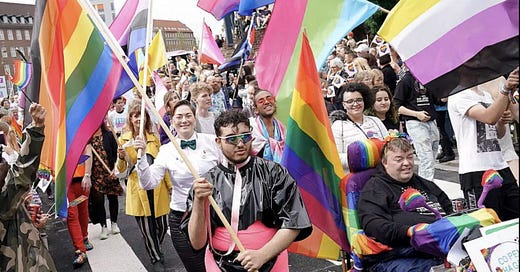Some are saying that wokeism has peaked in America; others say the war is already over and wokeism has won. At least it hasn’t conquered Denmark yet, and the resistance appears to be growing. Last week I wrote about the laughable arrival of a nonbinary cake-person. There have also been more serious events in recent months that throw doubt on the capacity of the new ideology to challenge Danish traditions and institutions:
Parliament adopted a declaration that academic scholarship should be objective, scientific, non-partisan, and non-activist.
It gave a sympathetic hearing to a proposal that universities adhere to the Chicago Principles on academic freedom, although it stopped short of making them mandatory.
The Danish Sports Confederation recommended excluding transgender women who are biological males from competing in elite sports.
I would like to take a look back at these developments sometime, but just last week—in the middle of Pride Month—came two new anti-woke campaigns. The first was from an organization called the Danish Rainbow Council (Dansk Regnbueråd), whose main purpose is to contest the claims of LGBTQ+ Danmark, the country’s leading gender-rights group. Its inaugural press release (DK) begins as follows:
The LGBT world itself has disastrously created the [serious, existential] threat: an ideological gender extremism that in recent years has attacked everything from biological women’s rights to our children’s psychological health. The extremists reject established science and undermine our freedom of expression. . . . The battle against this “politically correct,” deeply intolerant ideology will be the next great war over values.
The social contagion of social constructivism
This counter-movement is especially noteworthy because it has been launched not to defend the heteronormative patriarchy but rather by a group of lesbians, gays, bisexuals, and transsexuals. (Its chair, Marcus Dib Jensen, identifies as “transsexual” rather than as “transgender.”) This background enables the organization to be more blunt and categorical than straight people with similar views could be. They are concerned that what woke activists are advocating “in [their] name” is causing a backlash that hurts their community. “STOP gender transitioning of children,” it announces at the top of its Facebook page (DK). “THERE ARE only two sexes.”
These are the main objectives listed on the organization's website (DK):
• No surgical or medical treatment of children under 18 with puberty blockers. • No legal gender change for children.
• Access to women’s toilets, locker rooms, crisis centers, and prisons only for biological women.
• The Danish Sports Confederation should prohibit biological males from competing in all women’s sports (it now recommends that transgender athletes be allowed to participate in youth and recreational sports).
• The word “woman” should be reserved to denote a set of chromosomes and biological functions and should not be replaced by terms such as “birthing persons”.
• Trans ideology should be removed from sexual education teaching materials, from schools in general, and from Sundhed.dk, Denmark’s official healthcare website.
• Classical natural science should be reestablished in schools because social constructivism thrives on young people’s ignorance of biology and the scientific method.
• Gender dysphoria should be recognized again as a mental illness, and the role of social contagion, particularly through social media, should be investigated and addressed in an action plan ASAP.
As a political strategy
The second anti-woke effort, from the populist Danish People’s Party (DK), may be less credible, but it’s getting more attention. Its targets are broader than the Rainbow Council’s: identity politics, grievance and cancel culture, infringements on academic freedom, trigger warnings, and political correctness in general. It launched the campaign with a flier entitled “It’s okay to be ordinary.”
Skeptics see the program as an attempt to revive interest in the party since its trademark issue, immigration control, has lost urgency after centrist parties co-opted its position. The party just suffered a decisive loss in the referendum on the EU defense opt-out, and it recently underwent a divisive contest to elect a new chair. Afterward, several MPs left the party because they were unable to work with the winner, Morten Messerschmidt, one of the sponsors of the anti-woke parliamentary bills. Most observers doubt that the dangers of wokeism are palpable enough in Denmark to make the issue a rallying point for the party, especially at a time of rampant inflation and war in Europe.





